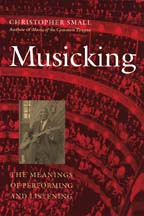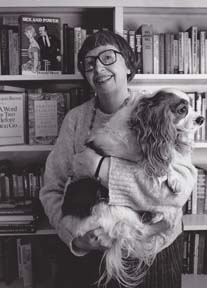Uncategorized
The passing of Christopher Small, Wesleyan author and musicologist
by selliott •
Jeannette Hopkins, press director (1980-89), dies
by selliott •
The literary world suffered a great loss last week when Jeannette Hopkins, renowned book editor, died unexpectedly at the age of 88. Hopkins died while in the hospital due to complications from a medical condition on Aug. 4, according to her niece, Carol Gray.
Hopkins was director and editor-in-chief for the Wesleyan University Press and an Adjunct Professor of English at Wesleyan University from 1980 until her retirement in 1989.
Cynthia Miller, now Director of University of Pittsburgh Press, worked closely with Hopkins at Wesleyan and recollects: “Jeannette was the best editor I’ve ever known, bar none, with a wide-ranging intellectual curiosity that informed her taste in books combined with a sophisticated sense of language and book structure. Jeannette was a tough task-master, always putting her authors and their manuscripts first and expecting hard work and exceptionally high-quality work from herself and her staff. I probably learned more in the two years I worked for her than I would have learned in five years with any other publisher. It is hard to believe that she is gone.”
Known for her extraordinary intellectual toughness—Hopkins forced authors to clarify and rethink their ideas, spending days with them at her home helping them shape their books through rigorous rewrites. Her commitment to her craft was evident up until the hours before her death, said Gray, who called her aunt one of the most influential and iconic book editors of the post-World War II era. “The latest manuscript she was editing lay on the table next to her bed,” Gray said.
Hopkins was highly respected in her field. The list of authors and editors she worked with included James MacGregor Burns, Kenneth Clark, Eugene Genovese, Jaques Barzun, Frank Mankiewicz, Edwin Newman, Annie Dillard, Edwin Newman, Richard Rovere, C.S. Lewis and many more. Also among Hopkins’s clients were many Wesleyan faculty and alumni. In her last years she and Richard Elphick of the Wesleyan History Department prepared for publication Cradock: How Segregation and Apartheid Came to a Small South African Town, a volume written but not completed at the time of his death by Wesleyan’s Jeffrey Butler.
“Jeannette was one of the great mentors of the publishing business. She loved having young people on staff, working in positions where they could make real contributions to the operation,” said Peter Potter, Editor in Chief at Cornell University Press, who began his career as an editor at Wesleyan. Gray added that while at Wesleyan, Hopkins enjoyed teaching a class on publishing. “She believed in having students learn publishing by doing,” said Gray. Potter further recounted that, “Every moment was a teachable moment for Jeannette. The end goal was to produce top-quality books, and she had the uncanny knack of getting everyone working together, striving toward that goal. Key to this, I think, is the fact that she never lost sight of what she had gone through when she started in the business. She was determined to have a staff that excelled through ability, regardless of whether they were men or women, and regardless of their race or background. She ran a tight ship but she treated everyone as equals–and, perhaps most important, she acknowledged a job well done. I will be always grateful to Jeannette for giving me my start in publishing. Not a day goes by that I don’t draw upon one of the many lessons I learned from her.”
Hopkins was born in Camden, NJ in 1922. She received a BA in English from Vassar College and a MS from the Columbia School of Journalism in 1945. She spent her early career working as a reporter for the New Haven Register, the Providence Journal-Bulletin and the Oklahoma City Times. At a time when women in the publishing industry were few and far between, she helped pave the way for female editors across the nation when she began working as a senior editor for the Beacon Press in Boston and eventually became a senior editor at Harcourt Brace. She left this post to become a senior editor at Harper & Row, where she spent close to ten years before leaving to set up her own editorial consulting business in New York City. During her time at Harper & Row, she also became executive editor of the Harper-Carnegie sponsored urban publications program.
Hopkins was very active in the Unitarian church, and was particularly interested in public affairs such as civil liberties and race relations. With Kenneth B. Clark she co-authored the book A Relevant War Against Poverty: A Study of Community Action Programs and Observable Social Change. Hopkins was an elected at-large member of the National Board of the American Civil Liberties Union and remained a member of the ACLU’s National Advisory Council until her death.
A memorial celebration service is slated for 10 a.m. Labor Day, Sept. 5, at South Church, located at 292 State Street in Portsmouth, NH. A reception will be held in Hopkins’ garden following the service. Donations in lieu of flowers should be made in Hopkins’ name to the NAACP Legal Defense Fund or the ACLU Foundation.
March 15: pages 46-47
by selliott •
Janet Soares at Tucson Festival of Books
by selliott •
Come meet Janet Soares, author if Martha Hill and the Making of American Dance, at the Tucson Festival of Books. She will be signing copies of her book on Saturday, March 13th, from 2-4PM, in the Author’s Pavillion.
Tucson Festival of Books, University of Arizona Campus, 1209 E. University Blvd., Tucson, AZ, 520-626-5653
Rae Armantrout poem in Washington Post
by selliott •
Poet’s Choice: “Money Talks” by Rae Armantrout
http://voices.washingtonpost.com/shortstack/2010/02/poets_choice_money_talks_by_ra.html
Poet’s Choice: “Money Talks” by Rae Armantrout
I wrote “Money Talks” in the fall of 2008 when we were hearing that the banks that had grown “too big to fail” were about to fail unless our representatives voted to give them huge subsidies. The poem really got started when I was thumbing through Vogue magazine and saw that “bondage and safari looks” were being touted that season. I thought those were some pretty interesting get-ups for the wealthy to wear as the middle class is driven towards bankruptcy. I began to imagine a personified Money sporting such styles. If you were a CEO, it might have been a good time to go on safari. Safari outfits are usually made of camouflage cloth. You might want to escape from view. On the other hand, bondage themed clothing might suggest that Money was a helpless victim, unable to help itself (or us). This vision of Money’s ensembles concludes the first section. When I’d written the first part, the poem still didn’t feel quite finished to me, so I let it sit for awhile. Then, not too much later, I was driving in Oakland, and I saw a billboard advertising a casino. I believe it showed an image of a roulette wheel. The only words on the billboard were the casino’s name and the command, “Shut up and play!” I imagined my personified Money saying this when it was tired of lying low and being coy. Stop complaining, Money says, and get back in the endless game. You may lose your house, but the House always wins.
Money Talks
1.
Money is talking
to itself again
in this season’s
bondage
and safari look,
its closeout camouflage.
Hit the refresh button
and this is what you get,
money pretending
that its hands are tied.
2.
On a billboard by the 880,
money admonishes,
“Shut up and play.”











